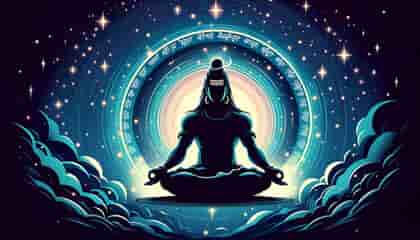
Maha Shivaratri is a very important Hindu festival celebrated every year in honor of Lord Shiva, one of the principal deities in Hinduism. The name “Maha Shivaratri” means “the Great Night of Shiva”. It is celebrated on the 13th night and 14th day of the lunar month Phalguna or Maagh (February or March in the Gregorian calendar).
Here’s some easy-to-understand information about Maha Shivaratri:
What It Celebrates: Maha Shivaratri celebrates the overcoming of darkness and ignorance in life. It’s a day to remember Lord Shiva, celebrate his virtues like compassion, love, and forgiveness, and his power and role as the destroyer of evil.
How It’s Celebrated:

Devotees observe fasts, chant prayers, and meditate. Many people visit Shiva temples or go on pilgrimage to Jyotirlingams, which are the 12 sacred shrines dedicated to Shiva across India. The night is spent in worship, singing hymns, and telling stories about Lord Shiva.
Rituals:
The Shiva Linga, a symbol of Lord Shiva, is given a special ritual bath with milk, honey, water, etc., believed to purify the soul. Bel leaves (a leaf considered very sacred to Shiva) are offered. Many also light lamps, offer fruits, and sweets.
Spiritual Significance:
The festival symbolizes the victory of light over darkness. Devotees seek Lord Shiva’s blessings for growth, prosperity, and liberation from the cycle of birth and death.
Fasting:
People fast during Maha Shivaratri, some consuming only fruits and milk, while others may not eat anything at all. Fasting is believed to cleanse the body and soul, aiding in spiritual growth.
Why It’s Special:

It is believed that the prayers and rituals performed on this night are especially powerful. For some, it is a day to reflect on one’s life and make resolutions for improvement.
Legends:
There are several legends associated with Maha Shivaratri, including the marriage of Shiva and Parvati, and the story of the hunter who unknowingly dropped leaves on a Shiva Linga while seeking shelter, which saved his life.
Community and Culture:
Apart from religious practices, Maha Shivaratri is also a time for cultural events, with performances of dance, music, and drama based on the life and legends of Lord Shiva.
In summary, Maha Shivaratri is a deeply spiritual and significant festival for Hindus around the world, celebrated with devotion, prayers, and cultural activities, all in honor of Lord Shiva.
Spiritual Awakening and Inner Peace
Spiritual Rejuvenation: It is a time for self-reflection, meditation, and seeking forgiveness for past sins. Devotees focus on self-improvement, spirituality, and closeness to the divine, aiming for inner peace and enlightenment.
Night of Awakening: The festival symbolizes overcoming darkness and ignorance in one’s life and the world. It’s considered an auspicious time for awakening one’s higher self.
Divine Blessings

Special Blessings from Lord Shiva: It is believed that worshipping Shiva on this day brings blessings and grace. Shiva is seen as the source of all creation, preservation, and destruction, and his blessings are sought for good health, wealth, and happiness.
Liberation (Moksha): There is a belief that by devoutly observing the day of Maha Shivaratri, one can attain moksha, or liberation from the cycle of birth and death.
Cultural and Social Gatherings
Community Celebrations: The festival fosters a sense of community and belonging, as people gather for prayers, chants, and rituals. Temples organize special events, and there’s a shared feeling of devotion and festivity.
Cultural Programs:,k Many places host cultural programs like classical dance and music performances, plays, and spiritual discourses, adding a vibrant cultural dimension to the celebration.
Unique Rituals and Practices
The Ritual of Abhishekam: The practice of bathing the Shiva Lingam with milk, honey, water, etc., is a significant ritual symbolizing purification and devotion.
Offerings and Sacrifices: Devotees offer bel leaves, fruits, and sweets to Shiva and observe fasts, which may vary from a partial to a full fast, or a diet of fruits and milk. These acts are seen as a way to cleanse the soul and show devotion.
Mythological Significance
Rich Mythology:
There are several legends associated with Maha Shivaratri, adding layers of meaning to the celebration. Whether it’s the story of Shiva’s cosmic dance, the marriage of Shiva and Parvati, or the legend of the hunter who was saved by divine intervention, these stories are a crucial part of the observance.
Environmental and Ecological Connection
Nature and Spirituality: The use of natural elements in worship, like water, milk, and leaves, highlights a deep reverence for nature. The festival reminds people of the close relationship between divine, human, and ecological well-being.
In essence, Maha Shivaratri is special not just for its religious significance, but also for its deep spiritual, cultural, and social importance. It offers a moment of introspection, devotion, and celebration that touches the lives of millions around the world.
may you like this follow us for other informationhttps://techadda360.com/adorable-deepika-padukone-height/

